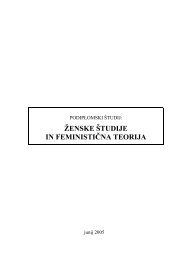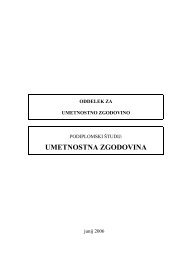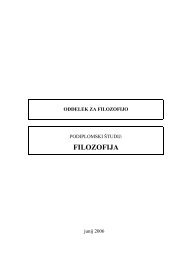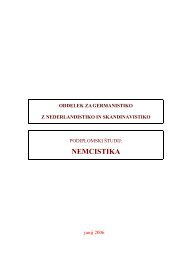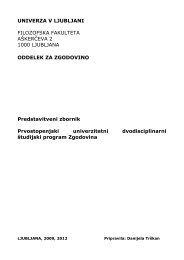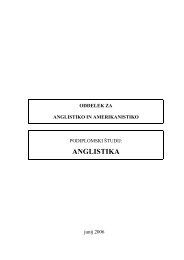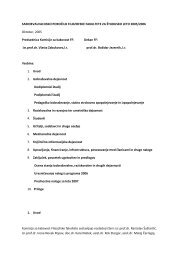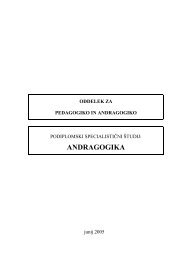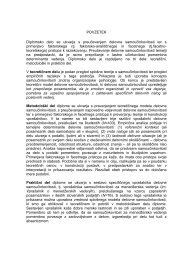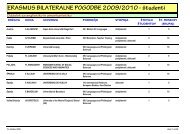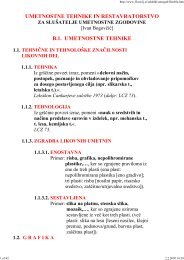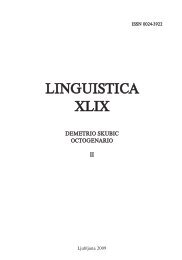B_solo_zgibanke male new_1 - Filozofska fakulteta
B_solo_zgibanke male new_1 - Filozofska fakulteta
B_solo_zgibanke male new_1 - Filozofska fakulteta
Create successful ePaper yourself
Turn your PDF publications into a flip-book with our unique Google optimized e-Paper software.
in trying to derive the noun from the Pie holokinetic aP nom.sg. *sH 2 éº-mō(n),<br />
acc. *sH 2 éº-mon-¯, gen. *sH 2 i-mn-és, loc. *sH 2 i-mén, in addition to systemic phonetic<br />
development also taking into consideration the Hittite analogical post-accentual<br />
position of the nasal and the introduction of the null-grade root makes it possible to<br />
recognize that the Hittite paradigm of iš$iman-/iš$imen- differs from Hitt. $āraš, acc.<br />
$āranan, gen. $āranaš, in which the barytone stem with a full-grade root and an<br />
o-grade suffix from the Pie holokinetic aP has been generalized. the Hittite<br />
declension of iš$iman-/iš$imen- shows the oxytone stem and, connected with this<br />
fact, a secondarily introduced null-grade root. it is also evident that the e-grade suffix<br />
in the accusative singular was secondarily introduced. Within Hittite, secondary<br />
oxytonesis has been also established in collectives with a comparable morphemic<br />
structure; cf. ú-i-ta-a-r < *1edr ← Pie *1édōr or $a-aš-ta-a-i < *H 2 est(H)º ←<br />
*H 2 ést(H)ōº. instead of the expected barytone nominative singular *iš$emaš, the<br />
oxytone form iš-$i-ma-a-aš probably results from generalization of the stem with the<br />
null-grade root and has no connection with the progressive accent shift in collectives.<br />
With the exception of the analogical single written nasal -m-, the instr. iš$imanda<br />
therefore reflects the old endingless loc.sg. *sH 2 i-mén, which has been extended with<br />
the ablative ending *-d: *sH 2 i-mén-d > Hitt. *iš$immanta → iš$imanda. 9 Based on the<br />
pattern of the Hitt. relation 1idanta < *1ed-én-d : 1itenit < *1ed-én-i-d we would<br />
therefore expect the standard instrumental to be *iš$imenit and not iš$imanit, as is<br />
attested. this was probably modernized from iš$imanda with the synchronic<br />
exchange of the instrumental ending (iš$iman-da → iš$iman-it) or, like abl.<br />
iš-$i-ma-na-az, also shows generalization of the suffix *-mon- in the oblique cases; cf.<br />
nom.pl.c. iš$imāneš < *sH 2 i-món-.<br />
to return to Oettinger’s interpretation – that in the relation iš-$i-ma-a-aš :<br />
iš-$i-me-na-an the accusative with the e-grade suffix is original, but the nominative<br />
with the ō-grade suffix is secondary (and i presume that the noun originates from the<br />
Pie holokinetic aP) – just the opposite explanation is much more probable; namely,<br />
that the nominative is original. in Oettinger’s view, such an interpretation is probable<br />
only for the Lithuanian situation. However, the comparable results in Hittite and<br />
Lithuanian could also originate from an identical linguistic tendency. Namely, it is<br />
very likely that the original situation is preserved in the nominative iš-$i-ma-a-aš, and<br />
that the accusative iš-$i-me-na-an is of analogical origin. Such an interpretation is<br />
much more probable also because of the Hittite relation ki-eš-ša-ar : ki-iš-še-ra-an.<br />
2.2. Hittite ki-eš-ša-ar : ki-iš-še-ra-an ‘hand’<br />
in the declension of keššar/kiššer-/kiššar-/kišr- (c.) ‘hand’ (cf. nom.sg. ki-eš-šar, acc.<br />
ki-iš-še-ra-an, gen. ki-iš-še-ra-aš, dat.-loc. ki-iš-ri-i, dir. ki-iš-ra-a, instr. ki-iš-šar-ta<br />
alongside ki-iš-ša-ri-it, acc.pl. ki-iš-še-ru-uš10 ), the full-grade root with the vocalic<br />
alternation kešš- : kišš- indicates that the noun must originate from the Pie<br />
9 On the prehistoric interpretation of Hitt. instrumentals, see klingenschmitt (1994: 240–241).<br />
10 the material is cited from Rieken (1999: 278 ff.) and Goetze (1937: 494 n. 1).<br />
295



